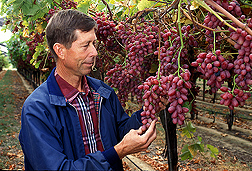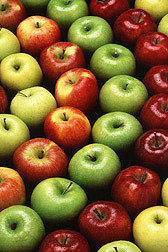This page has been archived and is being provided for reference purposes only. The page is no longer being updated, and therefore, links on the page may be invalid.
ARS Honors Technology Transfer Winners
By Marcia WoodMarch 7, 2007
WASHINGTON, Mar. 7—Superb seedless grapes and a new approach to safeguarding the flavor and texture of stored apples have garnered top technology-transfer honors for scientists with the Agricultural Research Service (ARS), the U.S. Department of Agriculture's chief in-house scientific research agency.
Horticulturist David W. Ramming and plant physiologist James P. Mattheis each won ARS' highest technology-transfer honor yesterday during the agency's annual awards ceremony at USDA headquarters here.
"The award acknowledges the scientists' outstanding efforts to move their research out of the laboratory and into the marketplace," said ARS Administrator Edward B. Knipling.
Ramming pioneered the use of a sophisticated laboratory technique known as embryo rescue to nurture the vulnerable, undersized embryos of experimental seedless grapes into strong, new plants. Ramming and his team are based at the ARS San Joaquin Valley Agricultural Sciences Center near Parlier, Calif.
"Dr. Ramming's expertise has resulted in popular new varieties of delicious red, white and black seedless grapes for fresh-market sale," Knipling said. "Many of the grapes ripen at times of the year when other, U.S.-grown seedless grapes aren't available."
Mattheis directs investigations at the ARS Tree Fruit Research Laboratory at Wenatchee, Wash.
"Dr. Mattheis spearheaded studies that have reduced the use of fungicides previously needed to protect stored apples from rots and other problems," said Knipling. "At the same time, Dr. Mattheis' research has enabled growers to better protect the flavor and texture of stored apples—including those that, with typical storage treatments, could lose their appeal all too soon."
A sugarcane-processing expert, and members of five research teams that worked on projects ranging from enhancing the shelf life of melons to quelling fire ant invasions, also were honored at Tuesday's ceremony. They are:
- Gillian Eggleston, chemist, ARS Southern Regional Research Center, New Orleans, La., for developing new, cost-saving procedures—now being used in Florida and Louisiana—to simplify processing of sugar cane. (Research news)
- The Areawide Suppression of Fire Ants in Pastures Team, for researching natural enemies of fire ants, such as phorid flies and beneficial microbes, and showing others how to use these helpful organisms to fight fire ants, a $5-billion-a-year pest in the United States. (Team members | Research news: 1 | 2 | 3 | 4 | 5)
- ARS Sugarcane Variety Development Team, for breeding new, high-yielding sugarcane plants that are becoming popular with Louisiana growers. (Team members | Research news: 1 | 2)
- The Melon Postharvest Quality Team, for creating a farmer-friendly approach to enrich the calcium content, improve flavor and prolong the shelf life of popular yet highly perishable melons such as cantaloupe and honeydew. (Team members | Research news)
- Root Zone Water Quality Model 2 Team, for improving and expanding a computerized model now used by scientists worldwide to predict how tilling and other farming practices affect the purity of runoff water—especially that which ends up in underground water supplies. (Team members | Research news)
- Seafood Safety Team, for producing a reliable test that public health laboratory staffers can use to help ensure that shellfish such as oysters and clams are free of harmful viruses. (Team members | Research news)



